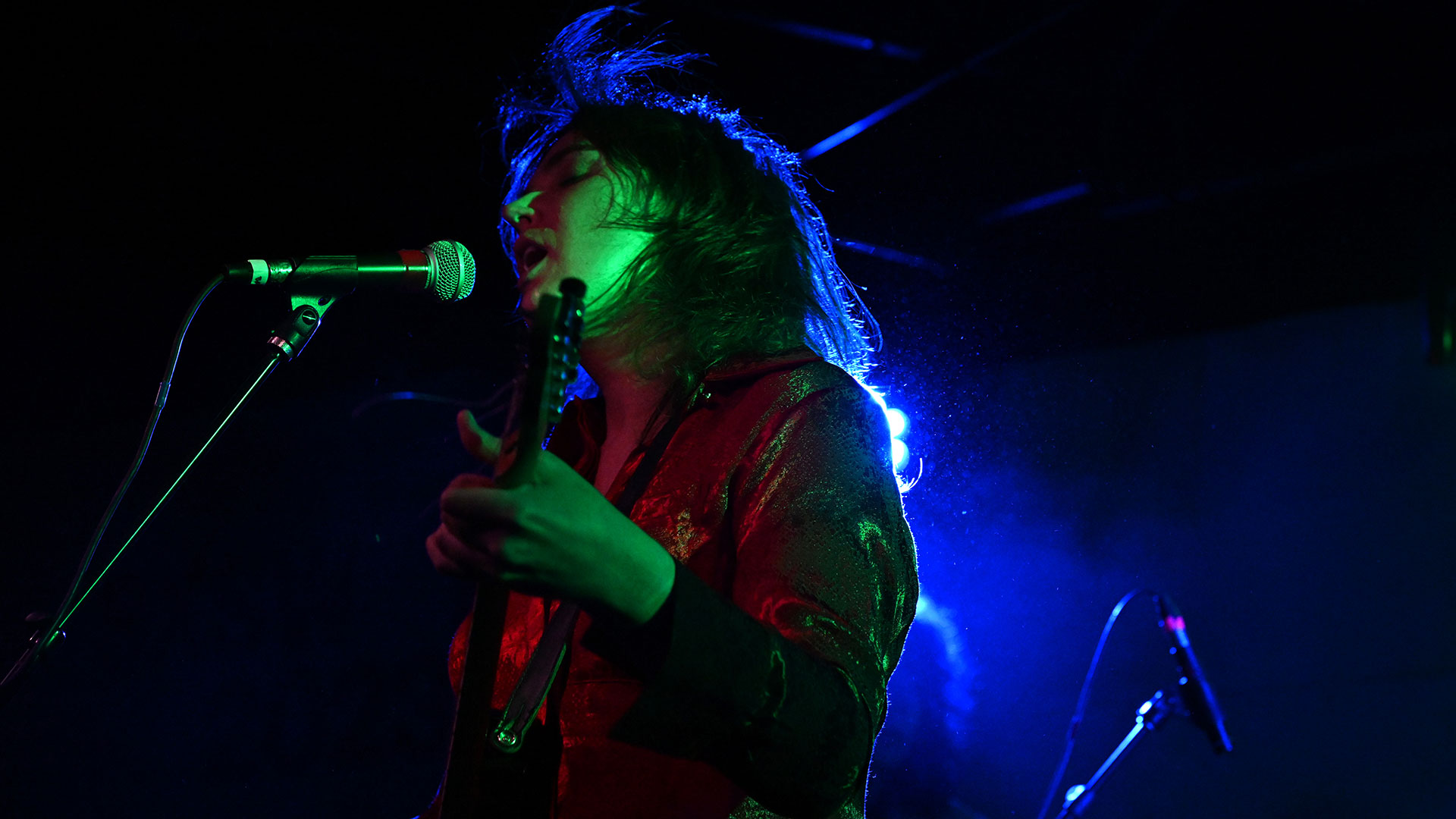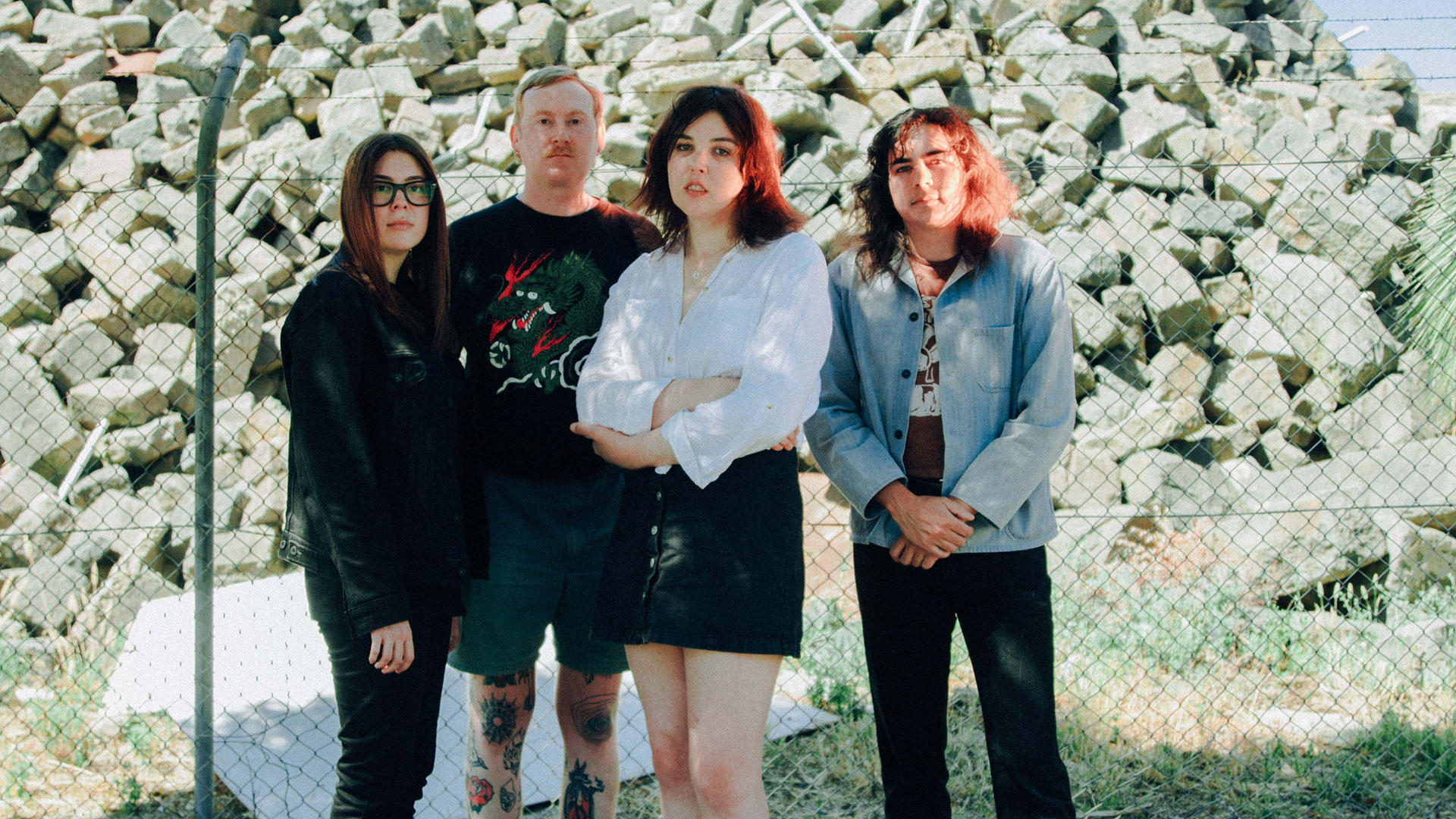Meet RVG, the Melbourne post-punks redefining the indie guitar hero with $5 Partscasters and Kate Bush’s acoustic guitar
The term guitar hero has become a loaded term in indie circles, but as the Australian quartet observe: “It doesn’t help that so many of them are talking f**king s**t nowadays”

You might call it fidgeting, or maybe, given the musical connotations, fiddling. Whatever your preferred terminology, there’s a nervous energy that powers Melbourne’s RVG.
“I think it’s quite Freudian, really,” says guitarist/vocalist Romy Vagar. “I used to smoke a lot. I have trouble not doing things with my hands all the time. When I was younger, guitar just filled that void. I used to sit there playing guitar, watching commercials on television and trying to copy them. And it just kept me busy. It’s just a compulsion.”
Vagar’s compulsion has powered the post-punk group – completed by Reuben Bloxham (guitar/synth), Marc Nolte (drums), and Isabele Wallace (bass) – through three acclaimed records, full of jangling rhythms, killer, hooky lead lines and wry lyrical observations. Most recently, with the excellent Brain Worms, which was released earlier this month.
Bloxham plays rhythm and synths (sometimes at the same time), leaving Vagar the room to roam to work in her “fiddly” lead work. There are solos, but – as we remarked in our write-up of addictive advance single Midnight Sun – they are short and tasteful wranglings.

“I’ve got guitar heroes,” acknowledges Vagar. “I really love Gary Marks from the Sisters of Mercy – that like Celtic guitar playing, just like playing off that D and the A. I will just totally rip those out, those fiddly [pull-offs]. That's a huge influence on our songs.”
Bloxham, meanwhile, cites PiL’s Keith Levene, alongside Johnny Marr and Rowland S. Howard, of Aussie indie legends The Birthday Party – whom they both dub “a local legend”.
In some ways, we’re surprised to hear an indie band happy to use the term guitar hero – it feels increasingly like a loaded term among some players, one that carries connotations of a certain generation and player type.
All the latest guitar news, interviews, lessons, reviews, deals and more, direct to your inbox!
“Yeah, it doesn’t help that so many of them are fucking talking shit nowadays,” adds Vagar. “Eric Clapton isn’t [known as] the nicest guy, but he’s been saying some wack shit in the last few years, especially!”
“He’s been saying wack shit since the fucking ’70s,” adds Bloxham, who observes that the guitar hero term has instead moved away from its boundary-pushing origins to indicate the sort of players who solo “relentlessly”.
“You play some great solos,” he tells Vagar. “And they don’t last 12 minutes.”
“That’s the next album!” jokes Vagar. “[That said] I love Free Bird. The solo in that I will just sing. I love that shit.”
The two regularly finish each other’s sentences and there’s a sense of two players who are very much at home with their roles as guitarists. You can hear it in Brain Worms – a third album that is less a reinvention and more a culmination of their blend of jangling, intricate guitar-driven indie rock. Tones and arrangements are spacious and refined, but still reassuringly gritty.
The band received a grant before heading to London for the recording sessions and put the money to use in the way most natural for musicians: by spending it all on gear.
“For the first few records, Romy was playing a Danelectro,” says Bloxham. “And then this time around, she was playing a Tele. Then I'd been playing this Partscaster guitar that I got for $5 at a garage sale, which was really good. But I got a Rickenbacker, just before we started recording.”
“It sounded immediately better, that Telecaster,” admits Vagar. “I don't know if I was just being a bit of a punk about it [before], maybe. I just liked the Danos. I've had a silver sparkly Dano that I got from my from my first job and it just was like my identity: kind of like fucking ridiculous-looking and ‘attitude’ all the time.”
Bloxham still used his Partscaster on Squid but says he experienced a similar sensation moving to his Rickenbacker, noting: “I feel like, for both of us, the new guitars had similar sounds to the old ones, but just richer.
“My old one was jangling in a nice way, but a Rickenbacker brought it out so much further. And then the same with Romy’s Tele: those lead lines just came through so much clearer.”

Producing the album at London’s Snap Studios with James Trevascus (Nick Cave & Warren Ellis, The Goon Sax) also afforded them access to some particularly choice loaner gear. Not least, a ’60s Epiphone Texan acoustic guitar that once belonged to Kate Bush.
“They told us she got it off Tears For Fears, who got it off Icehouse,” says Vagar. “And apparently it was used on Everybody Wants to Rule the World. [We used it] so much. It's quite low in the mix, but it added a little bit of sparkle on like some of the beats… just a little punch.”
Was there any detectable Kate Bush voodoo in the instrument? “It was just a very nice guitar,” emphasises Vagar. “Like a professional guitar that a professional person would have to write ’80s pop songs!”
Trevascus was crucial in refining their tone for the record, using an intriguing combination of vintage tube amps including a 1968 Fender Champ, and two lesser-spotted British brands, in the form of a WEM Dominator and a Wallace AC3500. However, Vagar says it’s actually the more run-of-the-mill stompboxes that are the crucial ingredient to her lush, jittering lead sound.
“My pedals setup is really important to the way I play,” she says. “When we started, an old member of the band gave me this blue Boss effects box, an ME-50, and there’s a really good sound you can get which is like this reverb modulation, which I used with the vibrato and has sort of become my sound on the guitar.”

As such, some grant money also went towards a new Boss RV-5, which “has the modulation setting” (Vagar insists that it’s not the same on the RV-6), alongside a Boss vibrato and a Walrus Audio Julia vibrato.
“You have these two vibratos, going at a similar depth, but slightly different speeds,” explains Vagar. “And it kind of adds a bit of organised chaos to it. It's as much as I can do to push it into some sort of dirty thing, while still sounding clean.”
It’s a nice summary of the line the band so ably treads, and there is something of a lyrical parallel at play, in terms of Vagar’s unobscured-yet-modulated guitar tones and an urgent lyrical style that wrongfoots you with unusual metaphors.
“I get that,” says Vagar. “For me, lyrically, a lot of Brain Worms is the frog in the boiling water thing. Things are getting quite bad and people are like, ‘It's not so bad!’ And just kind of everyone loses their minds. The things that I read, it's just like people are sick. The world feels like it is declining in a kind of strange way.”
Vagar’s nervous energy, her compulsion, is to document it in a way you can’t avoid or forget: hence Brain Worms. Romy fiddles, while the world burns, then – and we’re glad of it.
- Brain Worms is out now via Ivy League Records/Fire Records.

Matt is Deputy Editor for GuitarWorld.com. Before that he spent 10 years as a freelance music journalist, interviewing artists for the likes of Total Guitar, Guitarist, Guitar World, MusicRadar, NME.com, DJ Mag and Electronic Sound. In 2020, he launched CreativeMoney.co.uk, which aims to share the ideas that make creative lifestyles more sustainable. He plays guitar, but should not be allowed near your delay pedals.


![B.B. King [left] cups his hands to his ear as he asks the crowd for more. Joe Bonamassa, with a Les Paul, gives his crowd a thumbs up](https://cdn.mos.cms.futurecdn.net/P3XrQLh86C27JfPp4AGp6n.jpg)